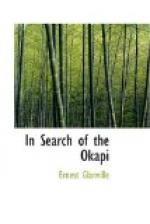“They move,” said Muata.
The others bent their heads, and presently they too heard the sound that had reached the keener sense of the warrior—a rhythmical beat and hum made by many paddles as the man-hunters, who had hidden behind the island, were dashing forward in hot haste to catch the Okapi, which they expected would be landing its crew. But the Okapi slipped on, and had a very good lead when Hassan and his slave-hunters set up a terrific outcry on finding that once more they had been tricked. They made right across in a long beat for the north bank, then working the screw in turns, with the great lamp at the bows to scare off the hippos, they made good progress till sunrise. For five days thereafter they kept steadily on their way, meeting with no adventure, and keeping out in mid-river to avoid the attention of the villagers. When, at intervals, they did land to buy goats’-milk, bananas, and manioc, they took precautions to approach clearings where there were only a few huts.
CHAPTER XII
THE MAN-EATERS
On the fifth day they turned from the mighty Congo into a tributary that threaded the dark mysterious forest, whose depths had never been trodden yet by white men, whose dark retreats and sombre avenues, into which no ray of sunlight struggled, were the haunt of the gorilla, of pigmies, and of cannibals, dreaded most of all. After the broad Congo this was a mere thread, no more than a few hundred yards across, a gloomy opening in the gloomy woods that marched right down to its shores; that sent out huge branches in a leafy roof over the water near the banks, making dark retreats, in which lurked watchful crocodiles. The stir and bustle of the great river found no echo in this silent byway. Nowhere was there any trace of man. The forest seemed impenetrable, beyond all his puny efforts to make a footing.
There seemed no room enough for a man to set his foot, so close was the foliage from the ground to the topmost bough of the tallest tree. Mile after mile they went on, without a sign of life, then from the shore an arrow whistled, pierced the awning, and rang on the metal deck.
Compton put the wheel over, and the Okapi slid away from that dangerous screen. Then they slowed up and looked, but there was no sound and no sign from the hidden enemy. Doubtless, fierce eyes were glaring out upon them, but they could see nothing, and with a long uneasy look all around they kept on for a mile or so, when they came upon a clearing that spoke of man. It spoke of man, but there was nothing living in the few acres that had been hewn out of the woods. A ring of black embers showed where huts had stood, a dug-out canoe lay half in, half out the waters, a broken clay pot, a rusty hoe, and a litter of bones were gathered forlornly in one spot, and a strip of cloth fluttered from a scarred post. They ran the Okapi in, and Muata, with his jackal, leapt ashore to decipher what this writing in the forest meant. The jackal showed none of the delight that a dog would have shown under similar conditions, but at once vanished into the wood, with his nose to the ground, bent on the serious business of life—that of nosing out the enemy, while his master, with his favourite Ghoorka knife in his hand, rapidly inspected the ground.




